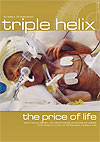Since April this year (1) the 'morning-after pill' has been available free from pharmacies across Wales, while still costing about £25 in the rest of the UK. Over 700 high street pharmacies can now provide it, even to girls as young as 13, without consent from a parent or guardian. But research into a pilot project in Bridgend has now questioned whether it is 'an appropriate use of NHS resources'.
According to BBC Wales 'Week In Week Out' programme, the paper, written by a specialty registrar working for NHS Trust Public Health Wales, said: 'Despite the increased uptake of EHC [morning-after pill] in Bridgend… the trend in conceptions for Bridgend was not significantly different to the rest of Wales.' (2)
Apart from ethical concerns we might have about the mechanims of action, bypassing parents and removing prescription from teh safety of the doctor-patient relationship, this was a strategy based on no evidence at all.
A paper published in the Journal of Health Economics (3) last December showed that morning-after pills don't cut teen pregnancy and actually increase the risk of sexually tranmitted disease. (4)
Sourafel Girma and David Paton of Nottingham University compared areas of England where the scheme was introduced with others that declined to provide the morning-after pill free from chemists and found that rates of pregnancy among girls under 16 remained the same, but that rates of sexually transmitted infections actually increased by 12%.
It seems that any effect on decreasing pregnancy rates had been cancelled out by rising levels of promiscuity, a phenomenon known as 'risk compensation'. I noted ath the time (5) that these findings were the latest nails in the coffin of the Labour government's teenage pregnancy strategy. This latest move is sadly yet another unfortunate, ill-thought out knee-jerk government response toe Britain's spiraling epidemic of unplanned pregnancy, abortion and sexually transmitted disease amongst teenagers. Providing free morning-after pills through pharmacies, when fully rolled out, will cost up to £300,000 a year, money that will be found from existing NHS budgets.
The best way to counter the epidemic of unplanned pregnancy and sexually transmitted disease is to promote real bahaviour change through such programmes as Love for Life (6) (Northern Ireland), Love2last (7) (Sheffield) or Lovewise (8) (Newcastle). These are initiatives in which CMF members are alredy involved. The government should be encouraging them.
































